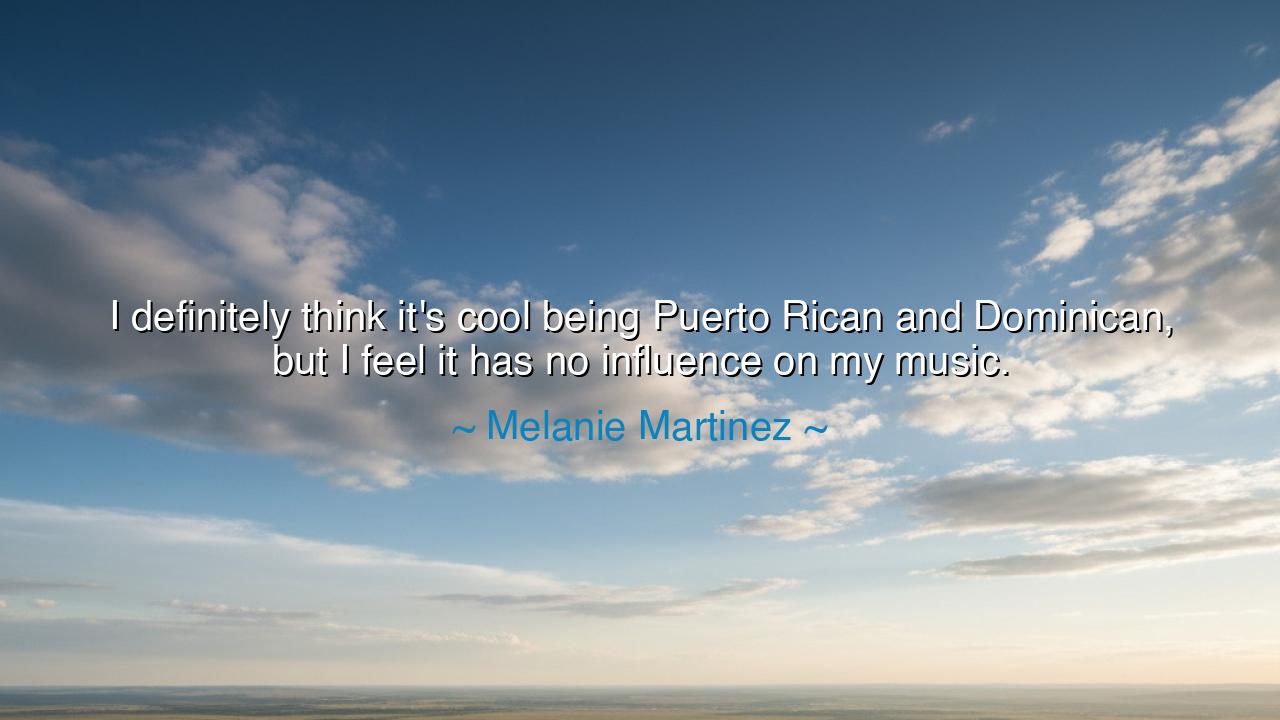
I definitely think it's cool being Puerto Rican and Dominican
I definitely think it's cool being Puerto Rican and Dominican, but I feel it has no influence on my music.






The words of Melanie Martinez—“I definitely think it's cool being Puerto Rican and Dominican, but I feel it has no influence on my music”—speak from the heart of a modern artist yet echo with a timeless spirit. They reveal the ancient struggle between heritage and individuality, between the world that gives us roots and the one we create for ourselves. Her words are not a denial of origin but a declaration of creative freedom. She honors her ancestry, yet she refuses to let it confine the expression of her soul. In this balance lies a truth as old as civilization: a person must know from whence they come, but they must also decide where they are going.
In the ages past, philosophers would speak of the dual birth of every human being—the one given by their blood, and the one earned by their spirit. The first is the gift of their people, their culture, their soil. The second is the birth of the self, the awakening of the inner voice that rises beyond the noise of tribe and tradition. Melanie’s words remind us that the artist, like the philosopher, is bound to this second birth. She acknowledges the pride of her heritage, yet she knows that art springs not from nationality, but from the secret chambers of the soul. To create is to cross borders; to be an artist is to belong everywhere and nowhere all at once.
This truth has been lived before, by others whose genius transcended the confines of their origin. Consider Frida Kahlo, whose art bore the colors of Mexico, yet whose pain, love, and defiance spoke to all humanity. Her Mexican heritage shaped her palette, but her spirit shaped her meaning. Or recall Ludwig van Beethoven, who was neither defined by Germany nor by Vienna, but by the unyielding will to compose while deaf to the world. So too does Melanie remind us that though our roots nourish us, they need not dictate the pattern of our growth. A tree reaches to the heavens not by clinging to the earth, but by stretching beyond it.
In her statement lies a subtle heroism—the courage to stand apart from expectation. Many would have her claim her identity as the source of her art, yet she refuses the simple answer. She says, in essence: “My art is my own.” Such words carry the weight of wisdom, for they teach that authentic creation must come from within, not from the pressure of belonging. To speak in one’s true voice is to be both grateful to the past and faithful to the present. To be an artist is not merely to echo one’s ancestors, but to add one’s own verse to the eternal song of humankind.
Yet let us not mistake her meaning for rejection. When she says that her heritage has no influence on her music, she speaks not from pride, but from purity. For influence, when it is uninvited, becomes a chain. But when it is embraced by choice, it becomes a flame. She honors her roots by freeing them—by allowing them to live through her as part of something greater. She embodies what the sages called the balance of being: to hold one’s origins in the heart, but not to let them dictate the hand that writes, or the voice that sings.
In truth, every soul must face this trial. The world will tell you who you are—by your blood, your birthplace, your color, your name. But wisdom whispers that identity is not inherited; it is forged. The ancients taught that the noblest man is not he who boasts of noble birth, but he who shapes his own destiny. Melanie’s words, though spoken in the language of music, carry that same defiance. She stands as one who honors the past but is not ruled by it—who looks into the mirror and says, “I will define myself.”
From this, a lesson shines forth for all generations: Be grateful for your roots, but be loyal to your soul. Let heritage inspire, but never imprison you. If your craft or calling demands that you walk a path unknown to your people, walk it without fear. If your art, your words, your work come not from tradition but from the quiet thunder of your own heart, then trust that sound—it is divine.
And so, to those who would live truly, take this as your guide: Honor your beginnings, but write your own story. Let your lineage be a foundation, not a limit. For every artist, every dreamer, every soul seeking truth must, in the end, stand alone before the mystery of creation. And in that solitude, as in Melanie’s declaration, lies the sacred freedom of the human spirit—to be born of the world, yet to belong to oneself.






AAdministratorAdministrator
Welcome, honored guests. Please leave a comment, we will respond soon